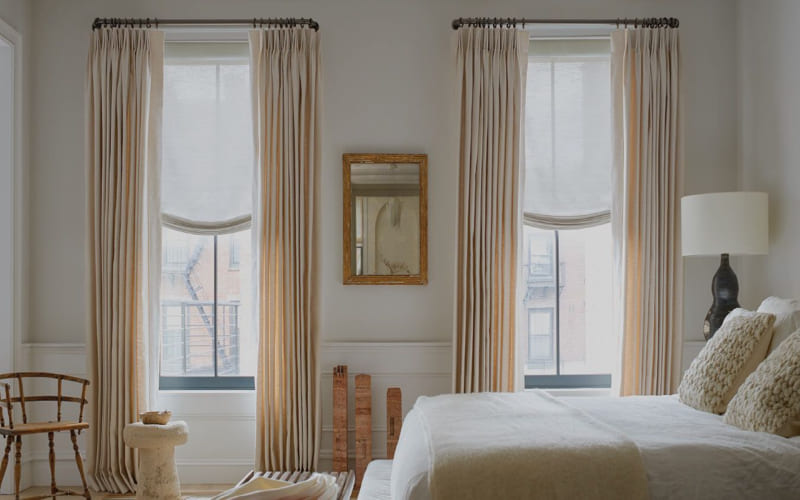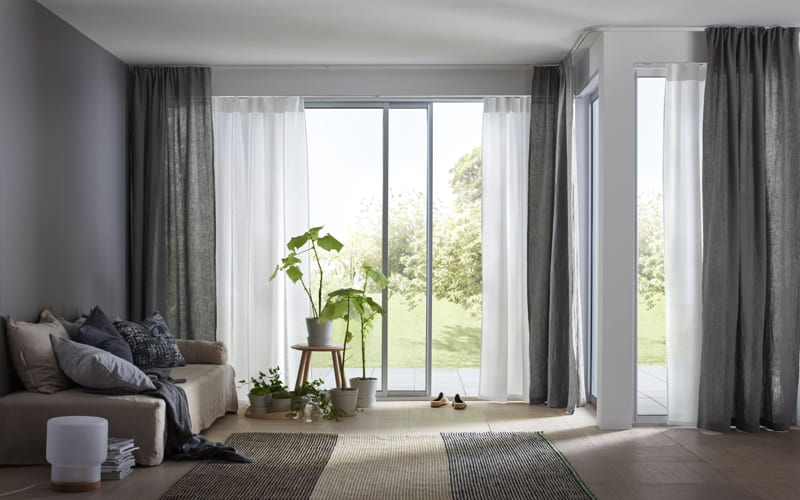Curtain sizes are measured by both length and width. Curtains come in lengths like 84 to 144 inches. The lengths are how long the curtains are. Window Curtains can also be wide, from 24 inches for small windows to very wide for big windows or sliding doors.
When deciding on curtain length, you’ll want the curtains to either brush the floor or puddle slightly. For width, choose a rod that extends 2 to 3 inches from the window frame on each side for a traditional look. More dramatic extended rods can also be used.
Curtain Length Recommendations
The ideal curtain length depends on your window height, ceiling height, and personal style. Here are some general guidelines:
| Curtain Length | Best Use |
| 84 inches | Just above floor length for standard height windows |
| 90 inches | Puddling to floor for 8-foot ceilings |
| 95 inches | Puddling to floor for standard 8-foot ceilings |
| 108 inches | Floor length for 9-foot ceilings |
| 120 inches | Puddling to floor for 10-foot ceilings |
| 144 inches | Puddling to floor for 12-foot ceilings |
Standard Height Windows
For standard-height windows with 8-foot ceilings, choose 90 to 95-inch long curtains to brush the floor. It gives the window a balanced look, with curtains framing it neatly.
Go slightly longer to the puddle if you want a romantic vibe. Avoid curtains that are too short and expose the windowsill.
Floor to Ceiling Windows
For dramatic floor-to-ceiling windows, use the tallest standard curtain length that fits your ceiling height. 120-inch curtains work for 10-foot ceilings and 144-inch curtains for 12-foot ceilings.
The curtains should puddle generously on the floor to create a luxurious feel. Don’t skimp on length with these tall windows, or the panels will look out of proportion.
Shorter Windows
For windows shorter than floor length, go with 84-inch curtains. Mount the rod above the window frame so the panels brush the bottom sill. It maintains clean lines instead of exposing the hardware.
You can also customize curtain panel length if your windows are an odd height. Just leave at least 1/2 inch extra so the fabric can puddle.
Curtain Width Recommendations
Choosing the right curtain width or fullness is key to getting that perfect draped look. Follow this guide for picking curtain panels wide enough to cover your windows attractively:
| Curtain Width | Best Use |
| 24 – 36 inches | Narrow windows |
| 40 – 50 inches | Medium width windows |
| 70 – 90 inches | Large windows |
| 100+ inches | Extra wide windows and sliding doors |
Narrow Windows

For slim windows up to 36 inches wide, use curtains that are 1.5 to 2 times the window width. For example, use 36-inch wide panels on a 24-inch window. It provides a tailored look without too much fabric bunching up.
Large Windows

Extra wide windows and sliding glass doors need extended curtain rods and super wide panels. For big windows 70 to 90 inches across, use panels 2 to 2.5 times the width.
Panels 120 to 240 inches wide create beautiful cascading folds. Use extra long 145-inch curtain rods to allow the panels to stack neatly.
Far Apart Windows
When hanging curtains over two separate windows, make each curtain panel slightly wider than the actual window. Then, overlap the panels in the middle by about 6 inches. It makes the windows look unified while still providing full coverage.
Some Essential Tips for Measuring Curtains
To ensure you get curtains that fit, it’s important to measure carefully before ordering. Here are some tips:
- Use a steel measuring tape for accuracy. Cloth tape measures can stretch over time.
- Record width and length measurements in inches to match sizing charts. Round up to the nearest whole inch.
- For outside mount rods, measure each window’s height and width. For inside mounts, measure the visible glass area only.
- Account for decorative hardware like finials when measuring rod length needed. Leave at least an extra 2 inches on each side.
- Measure from where you want the rod installed to where you want the curtains to fall. It is the total curtain length required.
- Measure the total window area, not each panel. For two 25-inch windows side-by-side, get 100 inches total of curtain panels.
- Order panels 2 inches wider than needed so the fabric can be hemmed if too long.
These measuring tips will ensure your new curtains fit perfectly in your windows for a flawless look.
Curtain Length Guide by Room
Curtain length can vary by room, depending on the mood you want to create. Here are some curtain-length suggestions for different rooms:
Living Rooms

In formal living spaces, use long 120 to 144-inch curtains that puddle lavishly on the floor. It creates an elegant feel that is perfect for entertaining. For a casual family room, go with 95-inch panels just skimming the floor. It’s still stylish but a bit more relaxed.
Bedrooms

In the bedroom, choose 84 to 95-inch long curtains. You want them to frame the window neatly but not drag it on the floor, which looks messy. For small basement windows, sill-length curtains around 36 inches long work well. They add coziness without dominating the room.
Kitchen

Utilize shorter curtain lengths in the kitchen for practicality. 60 to 84-inch tier curtains provide privacy while still allowing light in. Valances can also give the illusion of larger curtains without the hassle.
Dining Room

Use a formal 108 to 120-inch curtain in the dining room. The long, puddled panels create a sophisticated backdrop for entertaining. Just make sure curtains don’t drag over buffet tables. Mount the rod above the window trim rather than the ceiling for the best visual balance.
Conclusion
This detailed guide helps take the guesswork out of choosing the perfect curtain lengths and widths for your home. Follow the standard size chart, take accurate measurements, and use the length calculation steps to ensure your new curtains fit flawlessly. Room décor, window sizes, privacy needs, and lighting considerations also impact curtain dimensions. With these tips, you can pick window treatments that complement your rooms beautifully.





